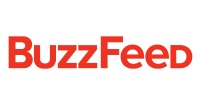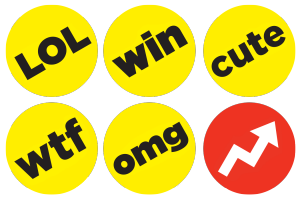BuzzFeed
|
Contents
History and Funding
BuzzFeed was founded in November of 2006 by Jonah Peretti and John S. Johnson. 8 years later, they were able to raise $50 million from venture capitalist Andreessen Horowitz. Since then, multiple big investors have made equity investments into BuzzFeed, such as NBCUniversal and General Atlantic. As of July 30, 2015, BuzzFeed is worth $1.5 billion.[3]
Content
BuzzFeed produces articles and news daily and focuses on a variety of topics. The main headings (or main topics) include
- News
- Buzz (entertainment news)
- Life
- Quizzes
- Video
Within the "More" section are 27 other headings which include Animals, Audio (information about podcasts, soundtracks, etc.), Big Stories, Books, Business, Celebrities, DIY, Entertainment, Food, Geeky (online fandoms and alike), Health, Ideas (thoughtful, lengthy, and argumentative articles), LGBT, Music, Parents, Podcast, Politics, Puzzles, Rewind (articles to remember the past), Science, Sports, Style, Tech, Travel, Weddings, Weekend (ideas for what to eat, make, or do over the weekend), and World.
Community
BuzzFeed has their own staff of over 700 employees, but they still encourage the community to write articles, and so BuzzFeed Community was created. This means that anybody who creates a BuzzFeed account can create their own content and quizzes to publish to the site and share with their friends. BuzzFeed uses a ranking system ("Cat Power") to determine how popular a user is among the Community. Cat Power increases as a contributor becomes more and more popular.
Video
BuzzFeed creates multiple different video channels on both YouTube and Facebook. There is a general BuzzFeedVideo YouTube channel, but there are also multiple other channels categorized by color and their content divided by mood. The full list of these accounts is:
- BuzzFeedYellow (fun and happy content)
- BuzzFeedViolet (good, slightly awkward videos)
- BuzzFeedBlue (bite size knowledge for a big world)
- BuzzFeedCentral (features, news, documentation)
- BuzzFeedPop (pop culture content)
- After Party (a fun, miscellaneous account)
- BuzzFeedCeleb (short celebrity interviews)
- CNNBuzzFeed (a partnership account condensing CNN videos)
BuzzFeed also has several Facebook accounts, including BuzzFeed Food, BuzzFeed Video, BuzzFeed, BuzzFeed Quiz, BuzzFeed DIY, BuzzFeed Health, BuzzFeed Books, as well as pages for the rest of the topics covered in BuzzFeed's main headings on their site and pages for the various colors in the YouTube pages. They also have several spinoff accounts, such as Tasty or Proper Tasty (both recipe accounts). Most of these accounts are mainly quick, 15 second videos to show an interesting procedure or recipe for users.
Newsletters
BuzzFeed offers to send newsletters to readers for the various subjects they are interested in. The newsletters are offered for the subjects of BuzzFeed Today (users receive this daily), Animals (3x a week), DIY (3x a week), Dude A Day (5x a week), Health & Beauty (2x a week), Sunday Features (once a week), BuzzFeed News (5x a week), Books (2x a week), Dog A Day (daily), Food (2x a week), Parents (2x a week), and This Week In Cats (once a week)3. These newsletters are helpful for those who do not have time to browse their favorite subjects, so BuzzFeed will send them a concise newsletter with the top articles of those subjects.
Advertisement
BuzzFeed generates revenue from advertisement through their site. Advertisers create their own posts related to their product or company, and BuzzFeed makes money from these advertisers. This is called native advertising because the posts look similar to BuzzFeed's typical content[4].
Ethical Concerns
In January of 2015 Buzzfeed posted an article titled The Buzzfeed Editorial Standards and Ethics Guide, written by the executive editor of Buzzfeed. Its aim is to keep writers, editors and reporters accountable to their readers. This in depth article was divided into four sections: 1) Sourcing, 2) Corrections, Updates, Deletions and Errors, 3) Legal and Ethics, 4) The Editorial and Business Relationship. This article is to serve as a guide not an FAQ section of the website. It is a place for contributors to reference what they are doing prior to publishing something on the site. Buzzfeed has created a large and loyal following through contributors adhering to these standards.
Plagiarism
Since BuzzFeed conglomerates and generates information already found on the Internet, there has been a huge discussion on whether the content uploaded by BuzzFeed is considered plagiarism. In the summer of 2014, BuzzFeed documented the firing of their politics reporter Benny Johnson who was accused of plagiarism. BuzzFeed’s recent statement on ethics does not define plagiarism as specific to new media or whether or not the same standards apply to old school journalism, but rather is particular to computer use. BuzzFeed takes the content from the Internet and creates photos, videos, and .gifs with funny entertaining captions that summarizes different topics. It has been said that Buzzfeed has ventured in native ads for politicians. Native advertising is known as “paid posts” where the company is getting paid for the amount of consumers they have reached for a particular article. This brings up also the idea of lawful acts since many consumers do not realize that they are looking at an ad as they peruse the content.
References
- ↑ Buzzfeed. ;http://www.buzzfeed.com/about "About Buzzfeed."] Retrieved on 14 March 2016
- ↑ Hilton, Shani O. "The BuzzFeed Editorial Standards And Ethics Guide." 30 January 2015. Retrieved on 14 March 2016
- ↑ Kosoff, Maya. "NBC is investing $250 million in BuzzFeed." 30 July 2015. Retrieved on 14 March 2016.
- ↑ Weinberger, Matt. "BuzzFeed pays Facebook millions of dollars to promote its clients' ads." 12 August 2015. Retrieved on 14 March 2016.

